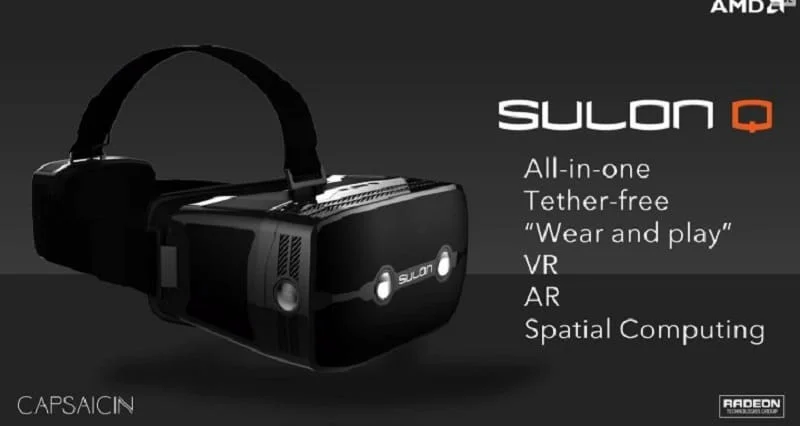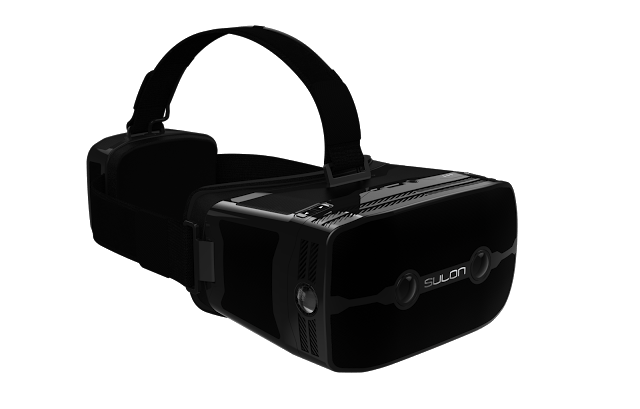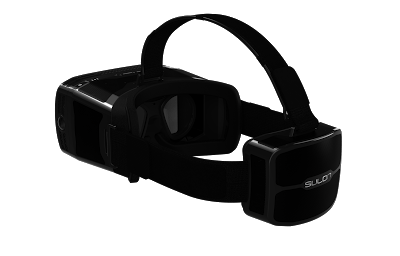
Sulon Technologies and AMD Announce The Sulon Q Wireless VR Headset
Paragraph

As we all patiently wait for the impending onslaught of news from this years annual GDC conference it looks as if a new wireless headset will be on the show floor this year. Sulon Technologies in partnership with AMD are ready to give the world a sneak peek at their newest headset, The Sulon Q.
The headset had its initial debut at the AMD “Capcaicin” event where Dhan Balachand, CEO of Sulon Technologies Inc. took the stage to give a glimpse of the device to a crowd of over 650 members of the press and development community showing off the forthcoming Sulon Q headset, as well as the experiences users can expect which include seamlessly transitioning between the real world and virtual environments.

The PR speak about this headset states that it is the world’s first and only all-in-one, tether-free, “wear and play” headset for virtual reality, augmented reality, and spatial computing. Sulon also states that the unit will have incredible console-quality graphics and powerful performance. Now this all sounds great at the moment, but until we start to see reviews of the unit I’m a bit sceptical. I do have to admit though that the expected specs are pretty impressive for a stand alone unit.
Sulon Q™ Headset
Expected Specifications
Experiences
VR, AR, and spatial computing
External Hardware
Lightweight, comfortable, ergonomically designed all-in-one tether-free form factor
Hardware
AMD FX-8800P processor at up to 35W with Radeon™ R7 Graphics leveraging AMD’s Graphics Core Next architecture
4 compute cores and 8 GPU cores unlocked through Heterogeneous System Architecture (HAS)
Sulon Spatial Processing Unit (SPU)
Memory
8 GB DDR3L Memory
Storage
256 GB SSD
Display
2560×1440 OLED display at 90 Hz
110-degree Field-of-View
Audio
3D spatial audio powered by GenAudio’s AstoundSound® technology
Built-in 3.5 mm audio jack
Custom spatially-optimized Sulon Q earbuds
Dual noise-cancelling embedded microphones.
Tracking
Sulon Spatial Processing Unit combining real-time machine vision technologies and mixed reality spatial computer for real-time environment mapping and tracking from the inside outward, dynamic virtualization for VR/AR fusion, and gesture recognition.
Sensors
Accelerometer
Gyroscope
Magnetometer
Spatial mapping and tracking.
Software
Microsoft Windows® 10
“Project Dragon” application for spatial computing
AMD LiquidVR technologies for ensure smooth and responsive VR and AR experiences.
Peripherals
Wireless keyboard and mouse provided in box
Any other Windows 10-compatible controllers and joysticks.
Connectivity
WiFi 802.11n/ac + Bluetooth 4.0
2 x USB 3.0 Type A, Micro HDMI OUT

So will this be a true contender in the newly forming stand alone HMD market? Only time will tell and I look forward to reading and seeing more about this new headset as GDC gets underway.
Brought to you by vrgamerdude of the VR Spies
www.vrspies.com
![]()
